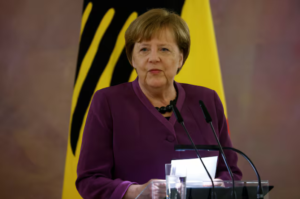
Germany’s Angela Merkel recalls tricky dealings with world leaders from Donald Trump to Vladimir Putin during her 16-year chancellorship in her frank memoirs, published as her legacy comes under intense scrutiny.
Here are some quotes from “Freedom: Memories 1954-2021” according to extracts released in Die Zeit weekly before next week’s official publication:
RUSSIAN PRESIDENT VLADIMIR PUTIN
“Someone who was always on his guard to avoid being treated badly and always ready to dish it out, including power games with dogs and making others wait for him. You could find all this childish, reprehensible. You could shake your head at it. But it didn’t take Russia off the map.”
“He was not interested in building democratic structures or prosperity for a well-functioning economy in his country or elsewhere. Rather, he wanted to counter the fact that the United States had emerged victorious from the Cold War. He wanted Russia to remain an indispensable pole in a multipolar world after the end of the Cold War. To achieve this, he primarily drew on his experience in the security services.”
WRANGLING OVER UKRAINE AT NATO SUMMIT IN BUCHAREST, 2008:
“I thought it was an illusion to assume that the Membership Action Plan (MAP) status would have given Ukraine and Georgia protection from Putin’s aggression, that this status would have had a deterrent effect to the extent that Putin would have accepted the developments without doing anything.
“Would it have been conceivable that NATO member states would have responded militarily – with material as well as troops – and intervened? Would it have been conceivable that I, as Federal Chancellor, would have asked the German Bundestag for such a mandate for our Bundeswehr as well and would have received a majority in favour?”
“In another context, which I no longer remember in detail
he (Putin) later said to me: “You won’t be Chancellor forever. And then they’ll become a member of NATO. And I want to prevent that.” And I thought: You won’t be president forever either. Nevertheless, my worries about future tensions with Russia in Bucharest had not diminished.”
ON DONALD TRUMP
“He saw everything from the perspective of the property developer he was before entering politics. Each parcel of land could only be sold once, and if he didn’t get it someone else did. That’s how he saw the world.”
“For years, the many German cars on the streets of New York had been a thorn in his side. That Americans were buying them could, in his opinion, only be due to dumping prices and alleged exchange rate manipulation between the euro and the dollar.”
She wrote how Trump did not shake her hand for photographers at a White House meeting in 2017 even after she whispered to him that they should. “As soon as I said that, I shook my head inwardly at myself. How could I have forgotten that Trump knew exactly what effect he wanted to achieve.”
“He was obviously very fascinated by the Russian president. In the years that followed I had the impression that politicians with autocratic and dictatorial traits captivated him.
“We talked on two different levels. Trump on an emotional level, me on a factual one. For him, all countries were in competition with each other, in which the success of one was the failure of the other. He did not believe that co-operation could increase the prosperity of all.”
CHILDHOOD AND LIFE IN COMMUNIST EAST GERMANY:
“Life in the GDR was a constant life on the edge. Even if a day began in a carefree manner, everything could change in a matter of seconds if political boundaries were transgressed… the state knew no mercy. Finding out exactly where these boundaries lay was the real art of living. My somewhat conciliatory character and my pragmatic approach helped me.”
She described a sense of superiority “because, despite everything, this state did not manage to deprive me of something that made me live, feel and sense: a certain degree of carefreeness.”

According to EastFruit analysts, Ukraine in the 2024/25 season continues to actively catch up with the world leaders in frozen raspberry exports, which remain Serbia and Poland. However, Poland is increasingly dependent on re-exports of products, mainly of Ukrainian origin, to hold on to its leadership position.
During the first three months of the season, from July to September inclusive, Ukraine exported more than 28 thousand tons of frozen raspberries and blackberries, which is a new record for this period. Exports thus increased by 36% compared to the same period last year and by 45% compared to 2022. It is noteworthy that the increase in exports comes against the backdrop of numerous reports from farmers about a lower raspberry crop in 2024.
“Although Poland remains the main market for frozen raspberries from Ukraine, its share in total exports continues to decline. Ukraine is gradually starting to enter with frozen raspberries directly into traditional markets for Poland, such as Germany and France. For example, this season the share of the German market in frozen raspberry exports from Ukraine already exceeds 20%,” says Andriy Yarmak, economist at FAO Investment Department.
Among the main markets for Ukrainian raspberries at the beginning of the season are also the Czech Republic, Lithuania, Austria, Belgium and Italy. Also in the new season, the first batches of Ukrainian frozen raspberries have already been shipped to such important and promising markets as the USA and Canada.
According to analysts, even Serbia, the world leader in raspberry exports, purchased a large batch of produce from Ukraine in September 2024, apparently for re-export.

Spanish authorities intend to regularize up to 300,000 migrants a year to make up for the country’s labor shortage due to an aging population, Spanish Social Security and Migration Minister Elma Sais said Tuesday.
“Spain has a choice between an open prosperous country or a closed poor country. We have chosen the second,” Western media quoted her as saying.
According to her, the policy involving migrants will last three years. She specified that Spain needs 250 – 300 thousand foreign workers a year, able to pay taxes, in order to preserve the welfare state.
The new measures of the authorities provides for simplification of procedures for issuing immigrants residence and work permits, which will contribute to the receipt of foreign workers guaranteed labor rights. In addition, newcomers seeking work will be able to extend their visa from three to 12 months. Foreigners with study visas will be allowed to work up to 30 hours per week.
The media notes that the economy of Spain – a country with a population of 48.9 million – is the fastest growing in the EU. This trend is also facilitated by the influx of skilled migrants from Latin American countries. Fitch Ratings Inc. estimates that more migrants will enter Spain in 2022 than in the entire previous decade at one time.
However, October opinion polls conducted by Spanish media showed that 57% of respondents believe the current level of migration into the country is too high. 54% believe that the real number of immigrants is higher than the authorities declare.

How banks’ profits and taxes have changed this year
UAH 117.63 billion of profit was earned by 62 Ukrainian banks after taxes for 9 months of 2024, according to the NBU. This is 7% more than last year. Privat continues to lead the way in terms of earnings, accounting for 41% of the total profit of banks. MTB Bank showed the best growth – 13 times over the year.
Ukrainian banks earned UAH 117.63 billion in profit, net of taxes, in the first 9 months of 2024. Despite the tax rate that increased from 18% to 25% this year, this is 7% more than last year: UAH 109.85 billion.
63% of the profit among all financial institutions went to state-owned banks. This is mainly due to the earnings of PrivatBank: UAH 48.35 billion or 41% of the total profit of all banks. Over the year, Privat’s profit grew by 11%.
In September, another Ukrainian bank became state-owned, Motor Bank. Currently, 2 out of 7 state-owned banks are unprofitable
Banks with foreign capital accounted for 23% of the total profit – UAH 27.32 billion. Only 1 out of 14 foreign banks currently suffered losses of UAH 139.57 million – Pravex Bank.
Raiffeisen remains the leader in the group: UAH 6.15 billion of profit (the same as in the same period last year).
Private banks made UAH 16.25 billion in profit. Their profits increased by 22% over the year. FUIB accounted for one third of the group’s earnings – UAH 5.18 billion. Over the year, the bank’s profit decreased by 9%.
MTB Bank had the largest increase in profit among all banks: by 13 times, up to UAH 603.59 million.
https://opendatabot.ua/analytics/banks-2024-9





Ukrainian farmers are forced to reduce selling prices for onions this week, according to analysts of the EastFruit project. According to market participants, the negative price trend is caused by several factors at once. First of all, the demand for onions has fallen significantly. At the same time, the supply of onions on the market has increased significantly. Small farms began to actively sell out of unequipped storage facilities and are ready to make concessions in the hope to realize the available volumes before the onset of frost.

To date, Ukrainian producers are ready to ship onions in the range of UAH 8-14/kg ($0.19-0.34/kg), depending on the quality and volume of products, which is on average 13% cheaper than at the end of last week.
Producers of these vegetables report a noticeable weakening of demand for onions, while supply on the market continues to increase. The increase in supply is due to the desire of farmers to get rid of substandard onions as soon as possible. At the same time, the demand for such products remains relatively low, mainly such onions are purchased by chains and resellers for current sales, as they are practically unsuitable for long-term storage.
It should be noted that today onions in Ukraine are already on sale on average 20% cheaper than in the same period last year. We would like to add that according to market participants, it is quite difficult to buy quality onions at the moment, as many producers have put such products in storage and plan to sell them only in the second half of the current season.
You can get more detailed information about the market development of onions and other horticultural products in Ukraine by subscribing to the operative analytical weekly – EastFruit Ukraine Weekly Pro. Detailed information about the product can be found here.

Prices for greenhouse cucumbers in Ukraine continue to rise rapidly for the fifth week in a row, according to analysts of the EastFruit project. The fixed positive price trend is associated with a further reduction in the supply of local products due to the seasonal factor, against the background of stable demand from retail and wholesale buyers.
According to the weekly monitoring of the project, today the majority of large greenhouse plants in Ukraine have already announced the actual end of the season of sales of cucumbers of the last turnover. At the moment, only a few farms are selling, and the quality of the offered products is often very low.

As of today, wholesale batches of greenhouse cucumbers in Ukraine go on sale at UAH 100-125/kg ($2.42-3.02/kg), which is on average 11% more expensive than a week earlier. According to market operators, the supply of imported vegetables at the moment cannot fully cover all the requests of buyers, which does not contribute to stabilization of the price situation in this segment.
It should be noted that at the moment Ukrainian factories already manage to ship cucumbers on average 72% more expensive than in the same period last year. At the same time, market participants are confident that the price growth in this segment may continue in the near future, as only new volume supplies of imported greenhouse vegetables to the domestic market can lead to a change in the current situation.
You can get more detailed information about the development of the market of greenhouse cucumbers and other horticultural products in Ukraine by subscribing to the analytical weekly EastFruit Ukraine Weekly Pro. Detailed information about the product can be found here.
https://east-fruit.com/novosti/pyat-nedel-podryad-v-ukraine-dorozhayut-ogurtsy/